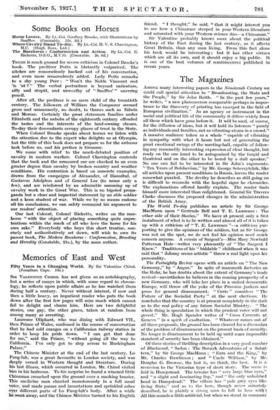Some Books on Horses
Horse Lovers. By Lt.-Col. Geoffrey Brooke, with Illustrations by Snaffles. (Constable. 12s. 6d.) Where Cavalry Stand To-day. By Lt.-CoL H. V. S. Charrington, M.C. (Hugh Rees, Ltd.) The Racehorse : Conformation and Action. By Lt.-Col. E. Ricketts, D.S.O., M.V.O. (Constable. 3s. 6d.) THERE is much ground for severe criticism in Colonel Brooke's book. The profiteer Potts is blatantly vulgarized. The
aitches are remorselessly harked out of his conversation, and even more remorselessly added. Lady Potts remarks to a shy young Peer : " Won't the Noble Viscount rest 'is 'at ? " The verbal portraiture is beyond caricature, silly and stupid, and unworthy of " Snaffles" unerring pencil.
After all, the profiteer is no mere child of the twentieth century. The followers of William the Conqueror seemed gross and unmannerly, no doubt, to thanes each as Edwin and Morcar. Certainly the great statesmen families under Elizabeth and the nabobs of the eighteenth century offended the tastes and the interests of the land-owning classes. To-day their descendants occupy places of trust in the State.
When Colonel Brooke speaks about horses we listen with the attention due to the expert who delights us at Olympia, but the title of this book does not prepare us for the arduous task before us, and his preface is tiresome.
We come with relief to the much-debated position of cavalry in modern warfare. Colonel Charrington contends that the tank and the armoured car are checked to an even greater degree than cavalry by broken country and weather conditions. His contention is based on concrete examples, drawn from the campaigns of Alexander, of Hannibal, of Gustavus Adolphus and of General Lee (to name only a few), and are reinforced by an admirable summing up of cavalry work in the Great War. This is no bigoted propa- ganda but a clear and impartial statement by an able soldier and a keen student of war. While we by no means endorse all his conclusions, we can safely commend his argument to our readers' attention.
Our last Colonel, Colonel Ricketts, writes on the race- horse " with the object of placing something quite unpre- tentious within the reach of all who love the horse for his own sake." Everybody who buys this short treatise, con- cisely and authoritatively set down, will wish to own its parent book, The Modern Racehorse : Conformation, Breeding and Heredity (Constable, 21s.), by the same author.


















































 Previous page
Previous page